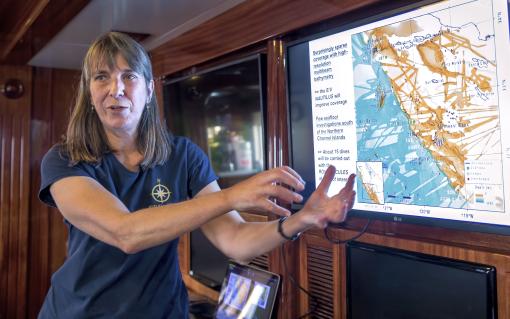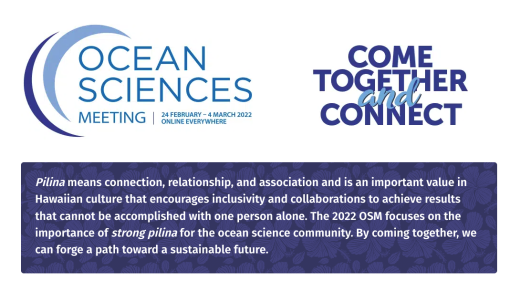Join the Nautilus Exploration Program at the Ocean Sciences Meeting 2022

The 2022 Ocean Sciences Meeting is being held virtually from February 24 through March 4, 2022. Featuring more than 5,300 ocean specialists from over 75 different countries, the program is a virtual conference with a scientific program and numerous networking and professional development events working toward the goals of the United Nations Decade of Ocean Science for Sustainable Development. You can register to participate online here, including free registration for any high school students and educators worldwide.
Below are some of the posters, talks, and projects being presented by OET team members, program alumni, partners, as well as collaborators working with data from previous Nautilus exploration expeditions. Join our team in celebrating these scientific discoveries building from our expedition results!
Monday, February 28
Times are displayed in (UTC-05:00) Eastern Time
DS03 Discovering the Unknown Ocean: NOAA Ocean Exploration 2001 – 2021
- Initial Results from E/V Nautilus Expedition NA128 “Cascadia Margin Seep Exploration”: Cascadia Margin Mapping, High-Resolution ROV Multibeam, and Gas/Fluid Sampling by Jeffrey Beeson (Oregon State University/NOAA PMEL)
- Highlights from exploring and characterizing the Cascadia Margin methane seeps over the past 5 years by Tamara Baumberger (Oregon State University/ NOAA PMEL)
- Geomorphic Analysis and Characterization of Features in the Clarion and Murray Fracture Zones, Central Pacific by Sean Maloney (College of Charleston)
- Phantom Farrea: Exploring relic sponge reefs in the Channel Islands National Marine Sanctuary, California by Abigail Powell (Lynker Technologies NOAA)
- Geothermal warm springs are incubators for deep-sea octopus reproduction by Jim Barry (MBARI)
- Putting Deep-Sea Corals on the Map: From Exploration to Conservation in the 21st Century by Thomas Hourigan (NOAA Fisheries)
ED06 Enabling Remote Ocean Science and Educational Opportunities, Lessons Learned During a Global Pandemic and Benefits for the Future
9:00 AM, 10:00 AM, and 11:30 AM
- Homegrown Ocean Science Engagement: Innovating with Cloud-Based Media Production to create Informative Virtual Programming during Remote Work and COVID-19 by Holly Morin (URI/GSO/ISC)
- Testing New Technologies and Workflows for Telepresence-Enabled Ocean Exploration by Dwight Coleman (URI)
- The Deep Ocean Education Project: A Collaborative Effort to Increase Access to Ocean Exploration Phenomena and Resources by Elizabeth Hoadley (National Marine Sanctuaries Foundation)
Tuesday, March 1
DS07 Advancing Ocean Exploration Technology 01
- Active perception to support high level cognition for underwater vehicle manipulator systems by Gideon Billings (University of Michigan)
- Measuring ephemeral methane seepage with the ABISS: Autonomous Biogeochemical In situ Sensing System by Hollie Emery (Harvard University)
DS06 Deep-sea Mining: Environmental risks and ecological baselines
- Microbial Ecosystem Services and Associations with Ferromanganese Crusts on Seamounts of Papahānaumokuākea Marine National Monument: Initial Results by Beth Orcutt (Bigelow Laboratory for Ocean Sciences)
- Evaluating microbial genetic resources associated with seafloor massive sulphide deposits: combining photogrammetric reconstruction and molecular diversity surveys by Moronke Harris (University of Victoria)
DSP02 Deep Sea Processes/Exploration Posters (DS01+DS04+DS05+DS06)
- Exploring Deep Sea Community Structures of the Southern California Borderland To Study Biodiversity by Francis Nguyen (California State University Monterey Bay/Scripps Institution of Oceanography)
Wednesday, March 2
DS07 Advancing Ocean Exploration Technology 01
- Suggestions for Supporting Marginalized Group Members at Sea by Aurora Elmore (NOAA Ocean Exploration)
- Partially automated robotic manipulation assisted by a shared autonomy framework for collaborative analysis and input from multiple remote scientists through natural language input and 3D scene understanding for real-time, in-situ elemental analysis by Amy Phung (Woods Hole Oceanographic Institution)
ED11 Global capacity development in ocean science for sustainable development
- Ocean Cultural Literacy: Capturing The Global Public with the Power and ‘Magic’ of Oceans in Their Lives by Anna Sulc (University of Washington Seattle)
ED12 Undergraduate Research in Marine and Aquatic Sciences
2:30 PM, 3:30 PM, 5:00 PM and 6:00 PM
- Photomosaic Mapping of the Ashes Vent Field Using Oblique ROV Footage by Sebastian Martinez (University of Hawai'i at Manoa)
DSP03 Deep Sea Processes/Exploration Posters (DS07)
Thursday, March 3
IN03A Indigenous Partnerships for a Sustainable Ocean
OP09 National Priorities for Ocean Exploration and Characterization within the US EEZ
DSP04 Deep Sea Processes/Exploration Posters (DS09)
ED08 Addressing Barriers to Minoritized Scholars Entering Internship, Fellowship, and Graduate Programs in the Ocean Sciences
ME18 Advances in seascape ecology for understanding marine spatial patterning and complexity
9:00 AM, 10:00 AM, 11:30 AM, and 12:30 PM
- Utilizing predictive models to identify and prioritize deep-sea coral and sponge habitats for future exploration and management within the Papahānaumokuākea Marine National Monument, Hawaii by Matthew Poti (NOAA National Centers for Coastal Ocean Science)
Friday, March 4
ME18 Advances in seascape ecology for understanding marine spatial patterning and complexity
9:00 AM, 10:00 AM, and 11:30 AM

